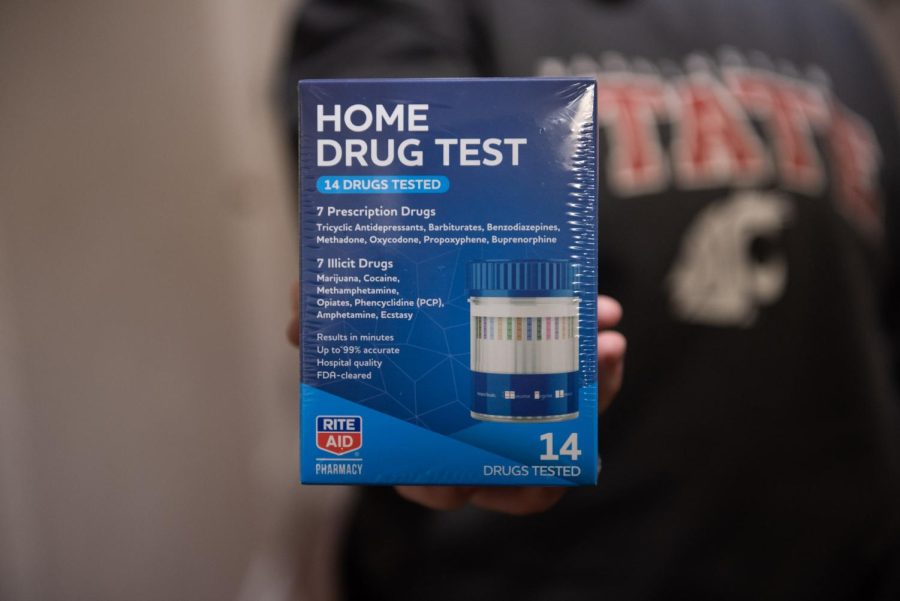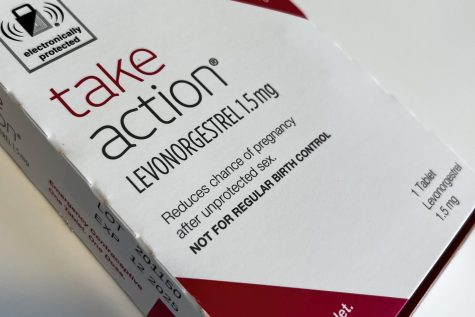Drugged drinks take toll on students this fall
ASWSU will provide Greek Life, residence halls with about 146 drink testing kits
Some sororities, like Alpha Omicron Pi, keep drug tests on hand for sorority members.
December 1, 2022
Editor’s note: some sources wish to remain anonymous or be referred to by their first name for the sake of privacy.
A freshman psychology major and sorority member was walking with her friends Sept. 17 when she passed out.
After she was carried out of a fraternity, her sorority sisters drove her to the hospital around 2 a.m., she said. The next day, she awoke in the hospital bed, lying in a pool of her own urine.
Someone drugged her drink, she said.
“Feeling almost out of control of how your body is feeling is one of the scariest feelings ever. … That feeling alone is something that is traumatic and that I will never stop scanning myself for,” she said. “Any time I drink, I’m like, ‘do I feel normal? Is this normal?’ … and I have to ask myself that all the time.”
Multiple instances of drugged drinks have occurred on campus this fall for Greek Life members and other students alike. However, Aaron Breshears, Pullman Police Department operations commander, said he has not seen any evidence of a date rape drug being administered in Pullman for the last several years.
“There have been instances where people have reported to us that they believe that they may have been exposed to something,” he said. “But none of those have ever panned out or had any independent laboratory testing to prove that one of those substances was put into a drink or found in someone’s body.”
For those like the freshman psychology major, they have experienced brain fog, stomach issues and the inability to feel like themselves weeks after the incident, she said.
“I would just think, ‘why did this have to happen to me? Why’d they choose me? Who is this? Who did this to me?’ It was just a bunch of not knowing,” she said.
Pullman Regional Hospital does not provide drug tests on weekends, meaning the nearest location for this testing is in Spokane, said Payton, Women*s Center violence prevention student coordinator. GHP and Rohypnol are common drugs used in these situations.
To prevent students from needing drug tests, ASWSU expects a shipment of drink testing kits to all residence halls and Greek Life chapters Thursday or Friday, following its meeting on Nov. 17, said ASWSU President Jacob Martinez.
Residence halls will receive 30-60 kits while Greek Life will receive 116, and 54 extra kits will be ordered. About $6,000 in funding for the kits will come from ASWSU’s Coug Health Fund.
Each kit has two strips, so students can dip a finger into their drink, place a drop onto the card and wait for it to change color, indicating the presence of a drug in the drink. While the tests from Amazon may not be as accurate as those in hospitals, it is a temporary solution as ASWSU pursues hospital-standard kits in collaboration with Cougar Health Services and Joel Schwartzkopf, assistant vice chancellor for student health and well-being, Martinez said.
“It’s helping out both communities, not only just the Greek Life community, but also being a part of residence halls and multicultural community as well,” he said. “At the end of the day, it is college, and everyone does go out, whether it’s to the bar or a friend’s house. It’s better to be safe than sorry just to have these tests.”
A junior marketing major said bracelets and nail polish that test one’s drink are already available online, but there may be a cost barrier for some students to buy large quantities of the products.
She knew her strawberry lemonade drink, which she believed her friend had brought, was drugged when a salty taste immediately overpowered its sweetness. She spat out the drink, and asked her friend where she got it. The friend pointed in the direction of a male student, having already drunk the drink.
She grabbed the student — who was not a fraternity member — asked his name and left with her friends.
Twenty minutes from the fraternity, she felt the drug kick in. Her mouth and tongue felt dry, and she felt nauseous. She had to skip class two days after she was drugged on Nov. 5 because she laid in her room throwing up.
Her friend reported the student who drugged them after the junior marketing major found him through social media, and WSU gave him a student conduct violation, in which he had to take a course and write a paper. He was also not allowed in fraternities following the incident and was charged by Pullman PD.
She has seen him twice on campus since she was drugged, which was unsettling. She said he should have been suspended or even expelled because her experience is one that “fucks with their [students’] heads,” impacting their health and grades.
“He was able to drug three girls, and he only got a paper to write,” she said.
A freshman sports medicine major from Chi Omega said it is “creepy” knowing someone who drugged her could still be walking around campus without consequence.
On Sept. 3, she attended an exchange, where her sorority and a fraternity were bonding, and she felt “weird” nearly an hour into a party. One of her bigs carried her from the house because she could not walk, and she went to Pullman Regional Hospital where they told her 18 girls who were drugged visited the hospital in the past two weeks, she said.
She reported the incident, meaning the fraternity had to choose between having its house searched or attending a programming, educating itself on the topic for an hour. She knew the fraternity would pick the programming rather than being searched, but she never heard what consequences befell the house, she said.
She felt as if the nurses and police department normalized her situation, blaming her and saying she should expect to be drugged if she participated in underage drinking, she said. After her blood was tested for specific drugs, she never received the results despite reaching out to WSU to advocate for her on her behalf.
The freshman psychology major also said the tie between sorority members and being drugged is disheartening and stigmatized. In the hospital, the nurses were rude until they took her blood tests and discovered she had been drugged.
“I rolled over onto my back and I made noise in the bed, and I heard out at the nurses’ station, ‘oh your sorority girl’s awake,’” she said.
Following her hospitalization, she submitted an anonymous report to the Panhellenic Council, which she learned a few months later was not anonymous as the council could see her WSU email and chapter attached to the form. She wanted to remain anonymous to have time to heal without dealing with the police, she said.
“It had really, really messed with my emotional well-being, and I didn’t want to have to talk about it, I didn’t want to have to identify people, I didn’t want to tell them every single person I talked to at that party that night. I just kind of wanted to bury it,” she said.
To keep their members safe, sororities have implemented preventative measures, including drug testing kits. Emma Downs, Alpha Omicron Pi president, said her chapter keeps about 15 tests from RiteAid on hand, each costing about $20 from the chapter’s budget. Every sorority also has about three to four “sober sisters,” who remain sober on assigned nights and are available if a member needs a ride home or feels unsafe.
“It’s really sad that girls have to take so many preventative measures to not end up in the hospital like I did,” the freshman psychology major said.
















JD • Dec 5, 2022 at 8:33 am
I just read your informative and disturbing story about student being unknowingly drugged. It would be good to know if this heinous act is a federal crime? It seems like it should be. If so, wouldn’t there be jail time?